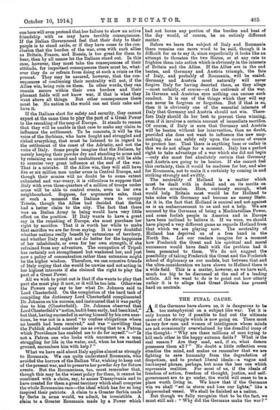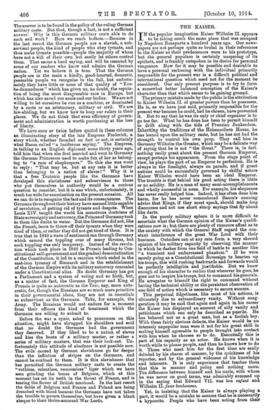THE FINAL CAUSE.
AS the Germans have shown us, it is dangerous to be too metaphysical on a subject like war. Yet it is only human to try if possible to find out the ultimate cause of the struggle which is now going on. There must be very few men and women of intelligence whose minds are not occasionally overwhelmed by the dreadful irony of the thought : " Why are these millions of men trying to kill each other in the happy autumn fields ? What is the real reason ? Are they mad, and, if so, what demon possesses them all ? " No doubt a little reflection soon steadies the mind, and makes us remember that we are fighting to save humanity from the degradation of despotism, and to protect liberal ideals—a vague and hackneyed phrase, perhaps, but none the less one which represents realities. For most of us, if the ideals of freedom of action, freedom of thought, justice, and self- government are to go under, the world will cease to be a place worth living in. We know that if the Germans win we shall "set in storm and lose our lights," like a shipwrecked vessel. We shall be finished as a nation.
But though we fully recognize that to be the fact, we must still ask : " Why did the Germans make the war? " The answer is to be found in the policy of the ruling German military caste. But that, though a fact, is not a sufficient answer. Why is this German military caste able to do such evil work ? Hero we reach bottom.—Because in the last resort the German people are a slavish, a sub- servient people, the kind of people who obey tyrants, and thus make tyrants possible—people the majority of whom have not a will of their own but easily let others control them. That seems a hard saying, and will be resented by some of our readers who know and admire the German nation. Yet we believe it is true. That the German people are in the main a kindly, good-hearted, domestic, peaceable people we recognize to the full, but unfortu- nately they have little or none of that quality of " You- be-damnedness " which has given us, no doubt, the reputa- tion of being the most disagreeable race in Europe, but which has also saved our souls and our bodies. We are not willing to let ourselves be run as a machine, or dominated by a caste or an aristocracy, military or civil. We are law-abiding, but we know how to keep our rulers in their places. We do not think that even efficiency of govern- ment and administration is worth purchasing at the loss of liberty.
We have once or twice before quoted in these columns an illuminating story of the late Empress Frederick, a story which, whether founded on fact or not, is certainly what Bacon cal!ed " a. luciferous saying." The Empress, in talking to an English diplomat some thirty years ago, told him that when she first married and went to Germany the German Princesses used to make fun of her as belong- ing to " a race of shopkeepers." To this she was wont to reply : " That may be, but at any rate it is better than belonging to a nation of slaves ! " Why it is that a free Teutonic people like the Germans have developed this slavishness and subservience to those who put themselves in authority would be a curious question to consider, but it is one which, unfortunately, is much too wide for examination on the present occasion. All we can do is to recognize the fact and its consequences. The Germans throughout their history have seemed little capable of revolution, of getting rid of tyrants and despots. When Louis XIV. taught the world his monstrous doctrines of State sovereignty and autocracy, the Princes of Germany took to them like ducks to water. But the Germans did not, like the French, learn to throw off their tyrants when they were tired of them, or rather they did not get tired of them. It is true that in 1848 a wave of sentiment ran through Germany which caused the toppling over of many thrones, but such toppling was only temporary. Instead of the revolu- tion which took place in 1843 in Prussia leading to Con- stitutional self-government and the gradual democratization of the Constitution, it led to a reaction which ended in the east-iron tyranny of Bismarck and in the establishment of the German Empire with its military autocracy concealed under a Constitutional alias. No doubt Germany has got a Parliament and a system of voting and so forth, but, as a matter of fact, the German Emperor and King of Prussia is quite as autocratic as the Tsar, nay, more auto- cratic, for, though the Russians are so much more primitive in their governmental ideas, they are not in essentials so subservient as the Germans. Take, for example, the Army. The Russians would not endure for a moment from their officers the kind of treatment which the Germans are willing to submit to.
Before the war a cynic, asked to pronounce on this situation, might have shrugged his shoulders and said that no doubt the Germans had the government they deserved. If they liked to be a nation of slaves and kiss the boots of a military master, or rather a series of military masters, that was their look-out. Un- fortunately this attitude of aloofness is not possible now. The evils caused by German slavishness go far deeper than the infliction of stripes on the Germans, and cannot be confined to them. It is this slavishness that has permitted the German military caste to create the "ruthless, relentless, remorseless" tiger which we have seen grinding the bones of Belgium, which at this moment has set its teeth in the throat of France, and is tearing the flower of British manhood. In the last resort the fields of Belgium and France and Poland are being drenched with blood because the Germans have not taken the trouble to govern themselves, but have given a blank cheque to their thrice-accursed War Lords,



































 Previous page
Previous page